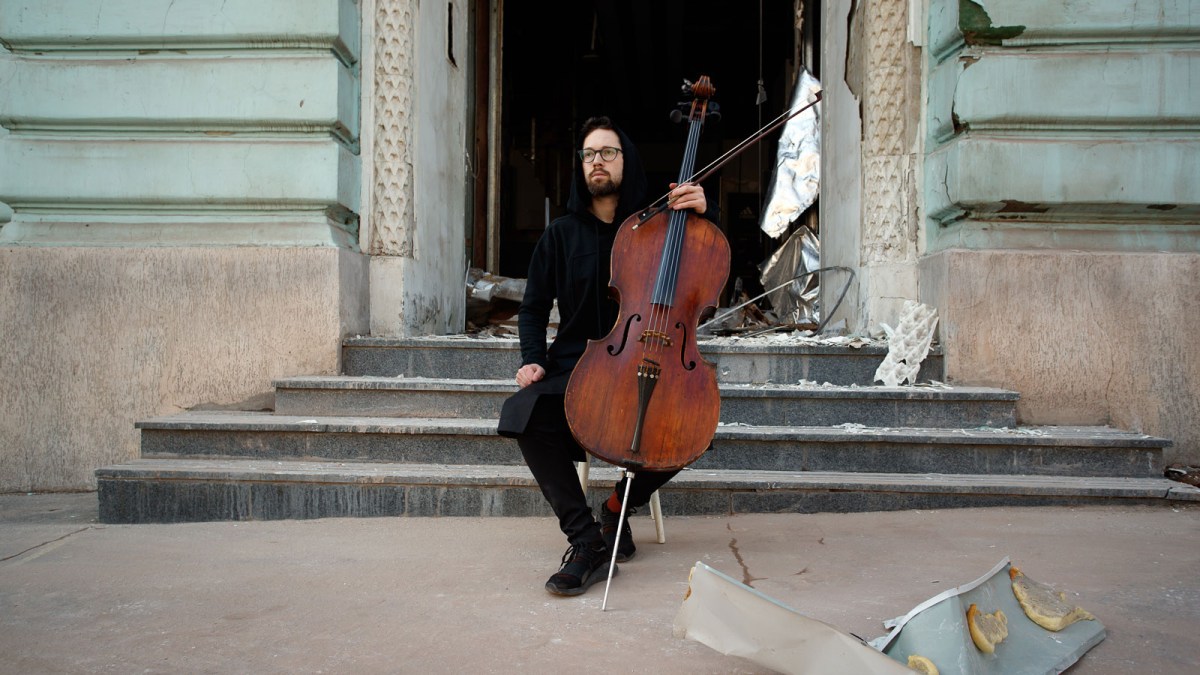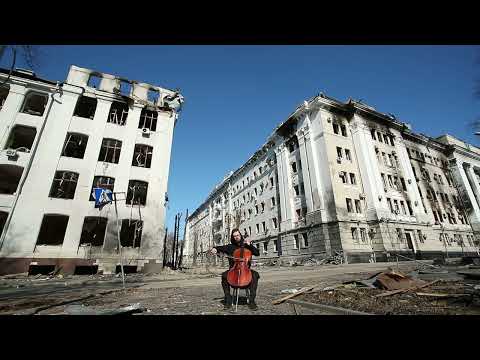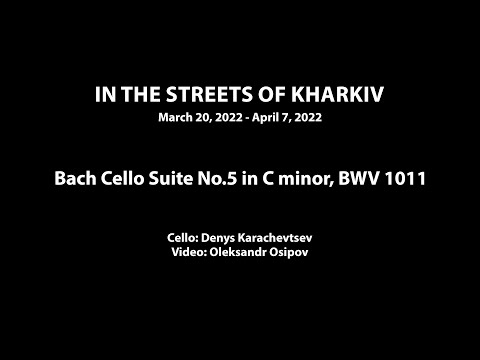In the first weeks of the Russian invasion of Ukraine, Denys Karachevtsev recorded himself playing Bach’s Fifth Cello Suite in front of bombed-out buildings in Kharkiv. The videos went viral, becoming iconic documents of the beginning of the war. Karachevtsev, aged 30, is a cellist at the opera house in Kharkiv and teaches at the local conservatory. In June, he moved to Berlin, where he has continued to teach online; he’s also working on an artist diploma from the Anton Rubinstein Academy in Düsseldorf. I met him one evening in September with his girlfriend Anna, who helped interpret when Karachevtsev found it easier to express himself in Ukrainian.
VAN: How did you get to Berlin from Kharkiv?
Denys Karachevtsev: In May, the opera house in Kharkiv had a tour planned to Lithuania and Slovakia. It became a kind of evacuation mission. Part of the ensemble is still touring, it’s on a humanitarian mission; the other part is trying to keep the concert schedule in Kharkiv going, playing in smaller chamber music formations for our audience and the army. From Berlin, I’m doing different projects to increase awareness of the situation in Ukraine.
Do you remember what the beginning of the war was like?
I felt like I was in the theater. When the first missiles hit, they woke me up, at four or five in the morning. I live right across from the military airbase at Chuhuiv. I looked out the window, and the whole sky was in flames. We realized immediately that the war had begun. Later that morning, we drove to Anna’s parents to make sure they were alright. My mother doesn’t live in Ukraine anymore; she’s in Turkey now. She had visited me in Kharkiv right before the war, but luckily she managed to leave the day before the invasion.
Had you started making preparations in case of a Russian invasion?
Up until the last minute, we’d hoped that it wouldn’t happen. At the same time, we knew we had to be ready just in case. I’d already packed a bag with the most important things; I had a full tank of gas in my car. That turned out to be a good decision, because the next week I was able to help people evacuate.
You said it was like being in the theater. Did it take a while for the new reality of war to sink in?
It does take time before you realize that what you’re seeing happen around you, the cruel cruelty of war, is actually happening. For a long time, I couldn’t shake the feeling that we were in a bad movie.
The latest from VAN, delivered straight to your inbox
A few weeks after the invasion, on March 20, you started playing Bach’s Fifth Cello Suite in the bombed-out ruins of buildings. What gave you the idea?
Sometimes, artistic ideas seem to just float in the air around you. We wanted to show the world what was being done to our city, and that everyone really can help in their own way. You don’t have to practice a military profession; you can be a classical musician, too.
Why Bach? Why the Fifth Cello Suite?
Bach’s music is always perceived as religious music: Hovering about the earthly in a way, but still capable of giving solace. There’s an interpretation of the Suites [by Steven Isserlis—Ed.] that sees them as a spiritual meditation on the life and suffering of Christ, with the Fifth Suite depicting the crucifixion and the Sixth the resurrection. That seemed like a good fit for what Ukraine is experiencing. We all hope we’ll be resurrected.
How did you choose which buildings?
They are almost all places I know well, that are dear to me, that I have specific memories of. In the first video, for example, I’m playing near the theater where I used to work. The park I was sitting in is called, fittingly, Victory Park. We just went out and filmed the videos. The bombings were so intense at the time that most people were hardly leaving bunkers like subway stations; the streets were nearly empty. It was pure luck that nothing happened to us. But at some point you started to feel like you were getting used to the attacks and the risks. It didn’t matter what you were doing—food shopping, sitting at home, playing cello on the street—the missiles could have hit you anywhere.
Your videos became a media phenomenon and went viral online. You essentially became famous overnight. Did you expect that to happen?
No, but, to return to your earlier question: That part was like a movie too. There was no more “normal” reality, there was something surreal about it. In that sense, it fitted in with everything else that was happening and didn’t feel unnatural. Everything had shifted anyway. I also think that, considering the circumstances, I didn’t completely process everything, because the events of the war felt so all-encompassing.
For me, the most important thing about the project—then and now—was to be able to do something for my country and for the city I love, as a musician. That was and is the core. In the first few weeks, I got a ton of [media] requests, but I knew that it wouldn’t last long and that the attention would die down with time. I didn’t see the project as a career opportunity either, though I did receive some job offers and invitations to play on projects after it.
Did you imagine how many people might watch and that they also might judge your playing?
No, not at all. It was about showing cultural resistance. Of course, under the circumstances, I wasn’t judging myself by the “normal criteria.” I was playing on the street; I just had one run-through, we couldn’t do multiple takes; you definitely can’t compare the sound to the concert situation. Of course I made “mistakes.” But they don’t matter much to me in the context of these performances. While we were filming the sixth movement, a missile hit an apartment complex right next to us. It was terrifying; you can hear I was playing much faster than I planned to, because my adrenaline spiked. But after Yo-Yo Ma posted the video, I just thought, “OK, it can’t be that bad.”
How have you changed as a musician since the war started?
Basically, I believe that music isn’t just about realizing the composer’s idea in sound—you also have to bring in part of your own interiority. In that sense, everything I’ve experienced, everything I’ve been through, plays a role, and the last year has been extreme, of course. But the main thing I learned is that my voice matters.
You live in Berlin now and recently played at a festival in Holland, which seemed, from the photos you posted online, to be a pleasant, harmonious experience. At the same time, you’re reading the news and seeing the images of war in your home. How can you bring those two, disparate things together?
I’m the kind of person who tries to see the good, the light, in every situation. Of course, when I first came to Europe, I was surprised that people were living normal lives, because I was still in a completely different reality. But that’s life: Even the craziest things become normal at some point. And then there’s space for new things. You can’t live in a state of shock forever. As Ukrainians, we’ve become more “professional” about what we’re going through: What can we do? What would be helpful? Where can we start? But I wouldn’t say that people have stopped paying attention to the war. Now it’s up to all Ukrainian artists to encourage people to think and feel, so that the tragedy we are experiencing right now doesn’t repeat itself.
Berlin has many Russians who have been living here for a long time, and due to the partial mobilization in Russia, there will likely be many more. Do you think there will be tensions between them and Ukrainians?
The nice thing about Berlin is that all kinds of different people feel at home here. Of course, there are many Russians, but a lot of them left their country a long time ago—before the invasion, before the annexation of Crimea, before the war in the Donbas—because they couldn’t stand the Russian regime anymore. As for the Russians arriving now, they are either avoiding the draft or have already deserted the army. It’s a sensitive question. The German government is humane for being willing to accept these people, but there is the risk of conflict.
What do you think of the debate about whether Ukrainian musicians should perform Russian repertoire or with Russian musicians?
I think the main thing is what’s good for Ukraine. The war isn’t just on the battlefield; it’s everywhere. Putin and his regime are trying to use every advantage they have: gas, oil, but culture, too. Russian culture can be a weapon, we have to be aware of that. Obviously, Putin and Russian culture aren’t the same thing, but he is trying to instrumentalize it in that way. For me personally, Russian culture seems poisoned. It feels that way, which is sad. We don’t play on the same stage as Russians and won’t cooperate with anyone under the Russian flag, whatever his or her position, that’s a matter of principle for us. I know there are many people in Russia who support us. But those who support us and understand the whole situation will understand and won’t expect us to put ourselves in the awkward position of performing with Russian musicians. They would understand that it’s not the right time for us to share the stage with them. It’s out of the question. ¶
Subscribers keep VAN running!
VAN is proud to be an independent classical music magazine thanks to our subscribers. For just over 10 cents a day, you can enjoy unlimited access to over 875 articles in our archives—and get new ones delivered straight to your inbox each week.
Not ready to commit to a full year?
You can test-drive VAN for one month for the price of a coffee.



